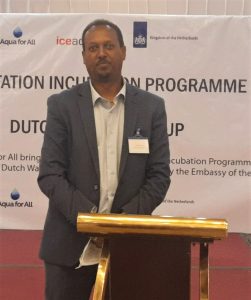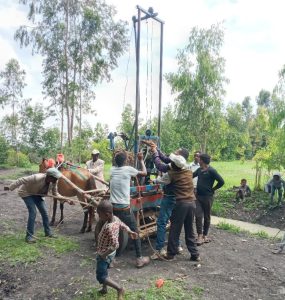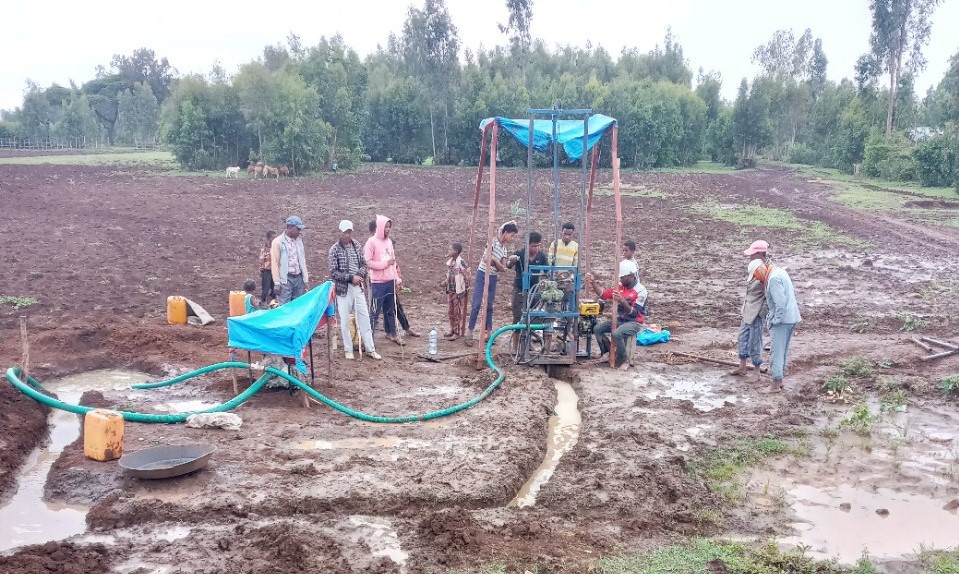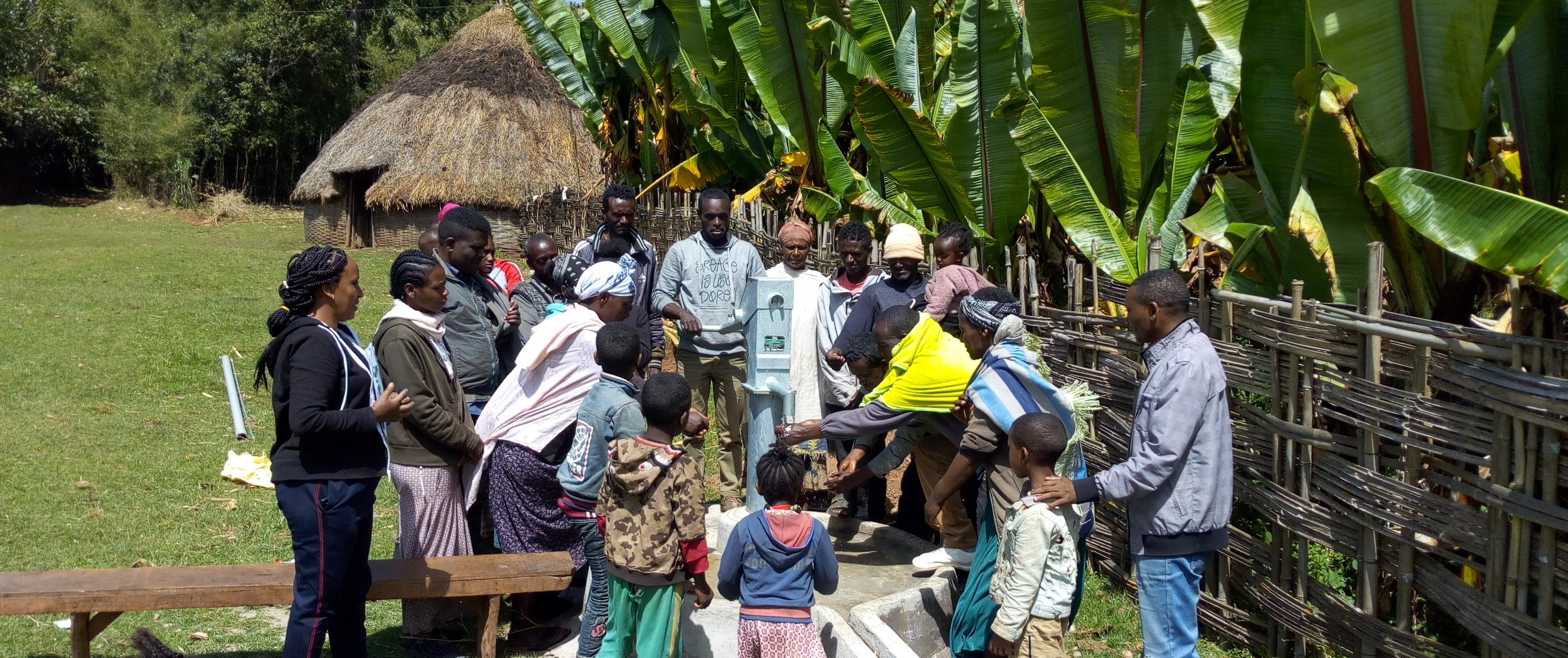Fasika Afework is the Managing Director of Waterlife PLC, a water service equipment company based in Ethiopia. He participated in Aqua for All’s Water and Sanitation Incubation Programme for local water and sanitation enterprises from autumn 2021 to spring 2022.
In this interview, Fasika shares his main takeaways from the incubation programme and elaborates on the business opportunities resulting from his participation.
Please tell us about Waterlife PLC
Waterlife PLC was established in 2017 to contribute to solving the water crisis in Ethiopia, which affects around 68 million people living in rural areas. We focus on providing affordable water for drinking, irrigation and livestock.
The enterprise is based in Addis Ababa, but we operate in rural areas where our solutions and technologies are the only options for accessing water.

Ethiopia has a rugged topography, which makes road access to rural communities impossible. Large hydraulic rigs and drilling machines that can only be transported by trucks cannot reach these areas to drill water wells.
But our technologies – manual well drilling tools and simple rig machines – can be carried by labourers, animal carts, or motorcycles. Because of that, we can drill boreholes in rural communities.
What makes Waterlife PLC unique?
Our approach is to offer low-cost water services for rural households, which makes us unique.
Waterlife PLC works in rural Ethiopia, which is considered unprofitable. Drilling water boreholes is very expensive. And conventional water companies only drill water wells when they are funded by the government or NGOs.
Drilling companies were established to make profit. In Ethiopia, less than 70 companies own large and medium drilling rigs. These companies have monopolised the market giving the customer no choice, but to pay high fees. The profit margin of a large drilling company is close to 10 times of the costs. Waterlife PLC prices are 10 times cheaper for shallow wells, and it is still profitable.
How do rural communities access water?
Rural communities cannot afford a water well drilled by large rigs because of their limited funds.
Large rig companies have purchased expensive machines using a loan. They charge more to get their return on investment in a short time to be able to repay their debt. This explains why it is not profitable for large companies to promote water well drilling in rural communities. These companies will get zero response as they charge ten times more than Waterlife PLC.
However, these large companies are contracted by donors, NGOs, or government bodies to drill deep wells and wells that service large communities. In rural areas, communities get water wells and pumps for free. This has created dependency and unwillingness to pay for water drilling.

How did you learn about Aqua for All’s incubation programme? Why did you decide to apply?
A good friend of mine sent me the link to this programme – he thought Aqua for All was looking for enterprises just like ours. The deadline for applications had almost passed but we decided to apply anyway. Why? Because we wanted to scale our business and reach more areas but clearly lacked management skills to realise our aspirations.
What are your main takeaways from the programme?
We realised that we needed to set clear goals for our enterprise. Our previous goals were not specific, well-articulated and well-documented. We did not even know how we were going to implement them. Aqua for All’s programme really helped us to sort this out.
We also learned that a successful business must include different multidisciplinary departments. Back then, we lacked someone with business expertise in our team as we only had technical staff. The programme opened our eyes and motivated us to hire the right additional personnel.
How did the company benefit from the programme?
We improved our business skills and got networking opportunities with other enterprises and ventures. Knowing which company is working in which WASH sector – for example, water well point provision or water purification – helped us to find a common ground and opportunities for collaboration. We were also introduced to national and international organisations working in the water sector. And in addition, we got the opportunity to have a website designed for us, which is very important for a scaling enterprise.
Did you get any funding opportunities as a result of participating in this programme?
At the moment, we do not have any funding to scale up. We want to manufacture more small drilling rigs, but currently we have a small profit margin, which covers our office and workshop rent and overhead costs. We therefore need more funds to grow.
As a result of Aqua for All’s acceleration programme, Waterlife PLC and two other companies formed a consortium and submitted a joint proposal to The Coca-Cola Foundation, which is very interested in our work. The foundation is reviewing the application right now and we hope it will be approved. Moreover, Aqua for All invited the programme’s participants to apply for funding, and we are preparing our proposal as we speak.

What are your plans for the next five years?
We want to increase our impact on the water sector and rural communities. Within five years, we plan to build around 1000 water points in rural communities with water shortage. We want to reach communities that can only access water through hand-dug wells. Our boreholes can reach a better aquifer that can provide clean and safe water.
We also want to be the preferred choice for rural households and NGOs in the Ethiopian water sector. For that purpose, we are establishing a marketing and business development department. After the incubation programme, we have hired a business development officer and a marketing officer to lead the process.
What is your advice for water and sanitation entrepreneurs?
Sustainable water and sanitation services can only be achieved through providing affordable water solutions and involving the private sector. Currently, the water and sanitation sector in Ethiopia is mainly driven by the government, NGOs and donor agencies. This has led to creating dependency among consumers in our country. Many households are given water services and products for free and therefore they do not want to pay for water or sanitation products and services. But not everyone has access to safe drinking water.
Private service providers are essential to solve the water crisis, but there are very few. We are one of them. Paradoxically, the market is huge: 68 million people need access to water. Big companies are doing the work, but this needs to be more effective and efficient. If enterprises -like Waterlife PLC- get involved, they will offer good quality services to be profitable and maintain a good reputation.
Water and sanitation enterprises also contribute to reducing local unemployment by creating additional jobs, especially for the youth. If thought out well, if known where and how to work and who to target, the water sector is a very profitable business.
Will you recommend this programme to other entrepreneurs?
Definitely! It will surely benefit your company – by training, networking and promotion opportunities. From the many benefits to this programme, I found the networking opportunities the most valuable.
